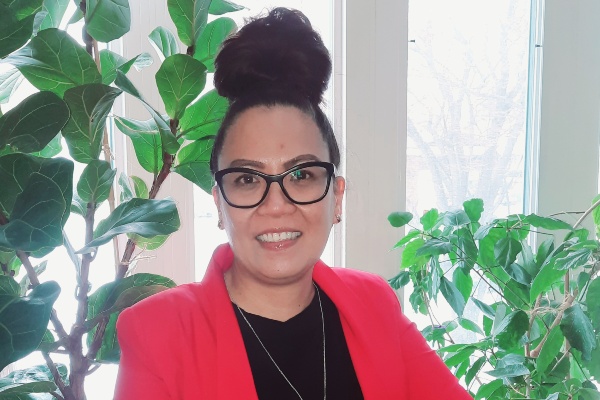
Making the research-policy connection
Microbiologist Dinah Tambalo seeks solutions to environmental and health problems.
By Joanne Paulson for JSGSIf you ask Dinah Tambalo (MPP ’20) how she came to study at the Johnson Shoyama Graduate School of Public Policy (JSGS), she will tell you, “It was a long road.”
About 11,300 kilometres, in fact, but that’s not exactly what she’s referring to.
Born in the Philippines, she took a bachelor’s degree and a Master of Science in Molecular Biology and Biotechnology before eyeing Canada as her next academic destination.
She moved in 2006 to pursue a PhD in Microbiology at the University of Calgary. After graduating, she worked as a Postdoctoral Fellow before coming to the University of Regina as a Research Scientist in the Biology Department.
“Most of the research I’d been doing was connected to environmental, agricultural, and societal questions,” Tambalo said.
“So things like, what could we do to improve crop production? How can we use microorganisms?
“I was also interested in looking at the water quality of lakes and rivers in Saskatchewan. Are there tools we could use to monitor water quality, especially for water used for irrigating fresh produce in Saskatchewan?
“That started to get my mind going into how I can contribute to those societal questions, maybe outside conducting the research.”
While asking herself these questions, she persuaded her brother to move to Regina, where he subsequently did his Master of Public Administration at JSGS.
He told her there was a Public Policy master’s degree too, and why didn’t she consider it? Good idea, she thought.
Already on the Regina campus, she “had heard great things about the school, so I knew the strength of the program, the quality of the internships they provide and the connections to provincial government and its agencies.”
Tambalo was also able to continue her work as a postdoc at the U of R while studying at JSGS.
“I thought the program was great because it’s designed for people like myself who are working, because they have classes you can take after five. I appreciated the flexibility.
“I was also fortunate to have a scholarship, called the Robertson Student Fellowship, through the late Dr. Bev Robertson who provided an endowment to JSGS.”
Part of the fellowship, early into her studies, included attending a Canadian Science Policy Conference in Ottawa with a “good mix” of politicians, entrepreneurs and policy people providing cross-pollination of ideas.
“That conference was eye-opening for me. I saw a lot of opportunities for me being a scientist and contributing to public policy work,” Tambalo said.
“I was amazed at the variety of important questions that people were asking. Climate change was and still is a big question today, and it was part of the discussion back then. Antimicrobial resistance, or antibiotic resistance, was another one, and that was actually the focus of my research when I did my public policy program.”
Her thesis was titled “Exploring the adoption and implementation of health care innovation: Case studies of Two Antimicrobial Stewardship Programs in Saskatchewan.”
The two case study programs were then running in the Saskatoon and Regina-Qu’Appelle Health Regions before the province amalgamated all regions into the Saskatchewan Health Authority. Tambalo investigated how the programs were established as well as how other hospitals could emulate them.
“Back then, and even today, there aren’t many of those programs in place in Canada or even globally,” she said.
“Antimicrobial or antibiotic resistance is also a big question in scientific research. I know as a scientist, as a microbiologist, it’s a big problem. In 2019, about 1.27 million people died from antimicrobial resistance. It’s a big burden for public health.”
Post-degree, Tambalo continued to work for the government, including stints with the Ministry of Environment and the Roy Romanow Provincial Laboratory, which gave her the opportunity to work on COVID-19 testing.
Her long and winding road has now taken her to the Water Security Agency as senior policy analyst — not a direct line, as she says, from her research, but definitely related.
“I’m helping with developing what we’re calling an agricultural water stewardship policy. We’re looking at roles of wetlands and how we can manage them because of the different benefits they provide.”
Making the research-policy connection has enhanced her career, Tambalo said. She describes JSGS as a strong school with excellent faculty, which also offers practical opportunities. Tambalo said she also learned a great deal from executives in government who have been in senior leadership, such as assistant deputy ministers, who provide workshops and guidance at the school.
“I am still attending those workshops as part of my professional development. They’ve experienced a lot and can share it,” she said.
“JSGS opened opportunities for me to work for government because sometimes those jobs are difficult to get. It opened doors for me having a public policy degree.”

